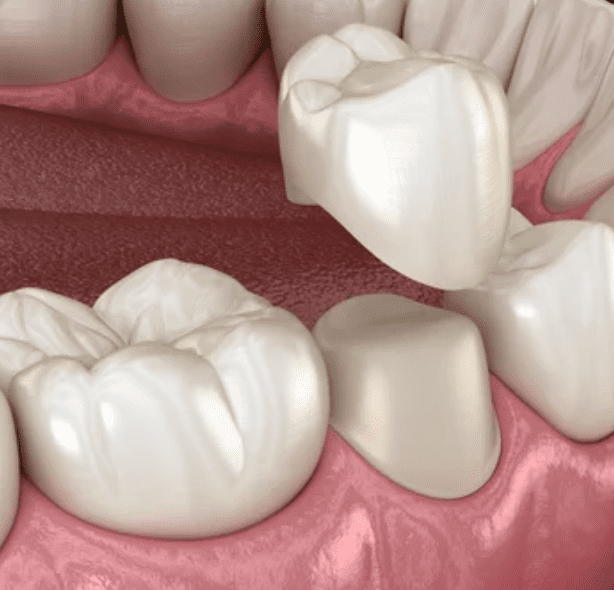Dental crowns are structures the dentist will place on your tooth to give it structure. While it is typically a restorative process, your dentist can also use them for cosmetic reasons. For example, your dentist will use a crown if you have a large cavity that is too big for a filling. Over time, your teeth can naturally wear down, affecting their shape. To correct this issue, your dentist will use a dental crown. In addition, if you have a root canal, you may also get a dental crown.
Depending on the material and your oral routine, dental crowns can last 5 to 15 years. They can be made of porcelain or metal. No matter the material, a dental crown acts as a “cap” to protect the delicate inner portion of your teeth.

What Is The Dental Crown Process?
The process of your dental crown depends on the type of crown you need. There are two types: a traditional crown and a same-day crown.
Traditional Crown
Getting a traditional crown takes multiple appointments.
First, your dentist will thoroughly examine your teeth to prepare for the crown. Typically, this will include a physical examination and x-rays. Next, they will restructure the tooth receiving the crown. For the crown to fit, the dentist will need to remove part of the enamel. Then, your dentist will take an impression of the tooth, including the surrounding teeth. This is so that they can create your permanent crown. Finally, they will place a temporary crown on your tooth.
It may take a few weeks for the creation of your permanent crown. However, your temporary crown will protect your tooth while you wait. Finally, your dentist will cement the permanent crown to your tooth.
Same-Day Crown
If your dentist offers a same-day crown, they can make the permanent crown in the office. Much like a traditional crown, your dentist will inspect your teeth. Additionally, they will take digital impressions to create the crown. They will still need to file down a portion of your tooth before they place the final crown.
Dental Crown Issues
Typically, getting a dental crown helps reduce pain or discomfort. However, you can still experience some issues. For example, you may experience heightened sensitivity to temperatures. This is because your dentist must remove part of your enamel, exposing the tooth’s nerves. As a result, your sensitivity should go away.
While dental crowns are strong, they are not unbreakable. You can still chip or break a crown like your natural teeth. Therefore, you should avoid hard foods that could damage your crown.
While it is rare, it is possible to have an allergic reaction to the dental crown materials. People who are sensitive to metals may have a difficult time with dental crowns.
Dental crowns do not decay, but the surrounding gum tissue can. As a result, you can still develop gum disease if you have a crown. Therefore, you must brush and floss your teeth regularly to keep your teeth healthy.
